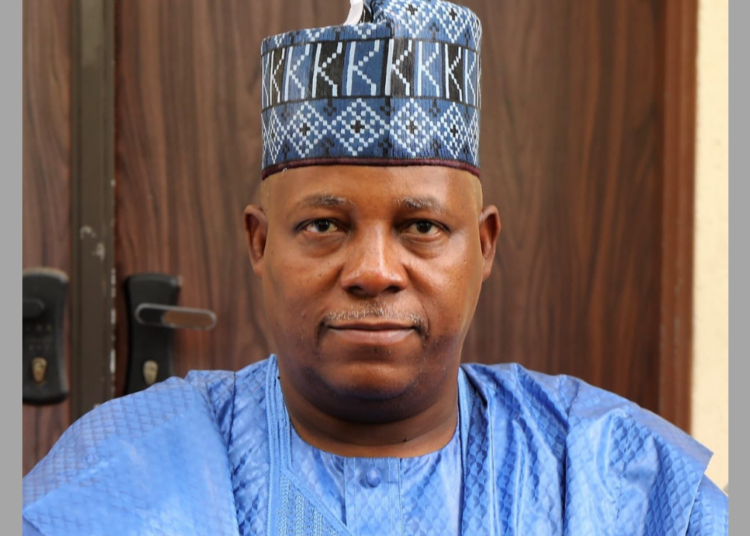The current vice president-elect, Alhaji Kashim Shettima, was more than just an ordinary running mate to Asiwaju Ahmed Bola Tinubu during the time of the contest for the presidency as he joined the ticket with the kind of weight and preparedness that were fully required of a serious contender. He, certainly, would not have been paired with Tinubu on the ticket if he were, in terms of personal appeal and political substance, just like all the several others who struggled to be so recognized.
Shettima went into the race with the kind of image that, obviously and easily, made him a tremendous asset for both the presidential candidate and the party–All Progressives Congress (APC). As a former Governor of Borno State who even served as the Chairman of Northern States Governors Forum, he adequately qualified for nomination for a contest in which issues about capacity for quality representation and service delivery were unmistakably dominant.
The process that eventually produced him as the running mate was evidently characterized by diverse interpretations of certain political realities vis-à-vis his backgrounds as a Northern Muslim as a result of which some varied conclusions were reached. At almost every point before and even after he was nominated, his religious faith, which is same as Tinubu’s, was freely made an issue of contention among the various groups within and outside the political class.
Almost every specific sense or consideration was used as a basis for the analysis of every factor or reality that was critical or essentially relevant to the choice of Shettima as the running mate. Arguments were made for and against, as the case might be, the selection of the former Borno State Governor with one group or another putting the issue in a context that best suited its interests.
The whole controversy revolved around political expediency on the one hand and the desirability or necessity for political balance as a basic form of fairness on the other hand. While Tinubu and the APC prioritized electoral victory, which the nomination of Shettima promised and eventually guaranteed, the other group(s) most strongly emphasized the need for the show of utmost sensitivity to the religious diversity in the country through the application of Muslim-Christian formula as against the Muslim-Muslim ticket.
However, just like Tinubu and the APC, a lot of stakeholders in the North were blind to religion of Shettima and therefore assessed him on the basis of his capacity and readiness for the representation of the region in a government that will be headed by a Southerner. The belief that the shift of power to the South would render the North relatively disadvantaged necessitated the search for the kind of person who, as vice president, would be a strong defender of the interests of the region.
Having acquired an experience as a junior partner in government during the tenures of Chief Olusegun Obasanjo (1999-2007) and Dr Goodluck Ebele Jonathan (2010-2015) with Atiku Abubakar and Architect Mohammed Namadi Sambo, respectively, as vice presidents, the North must have now been adequately prepared for all the foreseen constraints that such an arrangement portends. The continuous expression of concerns over the fate of the North under a Southerner as Nigeria’s president is a clear indication of a realization of the compelling need for an adjustment that can allow for the accommodation of the emerging realities.
Even with all the reservations that were expressed by some aggrieved groups over the emergence of Shettima as presidential running mate and now president-elect, there has been a reasonable consensus that he is one of the North’s best in terms of political experience, intellectual capacity and commitment to the protection of collective interests. The president-elect is widely considered as a Northern politician whose investment in the political project of the region is as colossal as the benefits he has derived from it.
There is an enough justification for the assumption that President-elect Tinubu is both aware and appreciative of the fundamental support the North gave him on account of which he won the election, thereby making the rising demand for a pay-back quite legitimate. It is, in fact, strongly believed that Shettima must not have to be there as vice president, before Tinubu remembers that he has signed a contract with the Northerners.
The prevailing insecurity, collapse of industries, decline of agriculture and some other related challenges were the subjects of discussion between the president-elect and the various stakeholder groups in the past several months, as a result of which the hope for a better North has rapidly thickened. Such a fulfilment of promises, particularly in this case, is a shared responsibility of Tinubu and Shettima, which they must discharge.
But there are areas in which the vice president-elect will be required to be far more forthcoming than his principal, because he is a Northerner. As a product of the environment who is therefore conversant with all the settings that have made up the North as a vast geo-political entity, Shettima’s determination to the resolution of the prevailing crises should be much stronger than Tinubu’s.
This is the basis of the questions: What can Shettima do for North? Which special or critical roles should he play as vice president to strengthen the North and make it sufficiently ready for competition with the other parts of the country? How can he ensure that the North gets benefits from the next government that are commensurate to its contributions to the process that has now ultimately produced victory?
The manner in which he handles the apparent underdevelopment in the North and the disturbing disunity among its peoples will show whether or not he is the right choice for the job. As he prepares to take over as the biggest and most influential political office holder from the region, the most minimum duty he should execute is the adoption of effective strategies for the restoration of its glory.
It is absolutely important for the in-coming vice president to realize the fact that the North has already begun to await the kind of approach he will adopt, with the hope that he will succeed where the past two Nigeria’s vice presidents of the Northern extraction—Atiku and Sambo—failed. He needs to understand the extent of the disappointment that the Northerners have suffered as a result of the failure of his predecessors in office to address the identified crippling challenges and consequently come up with his own style that can be a game-changer.











